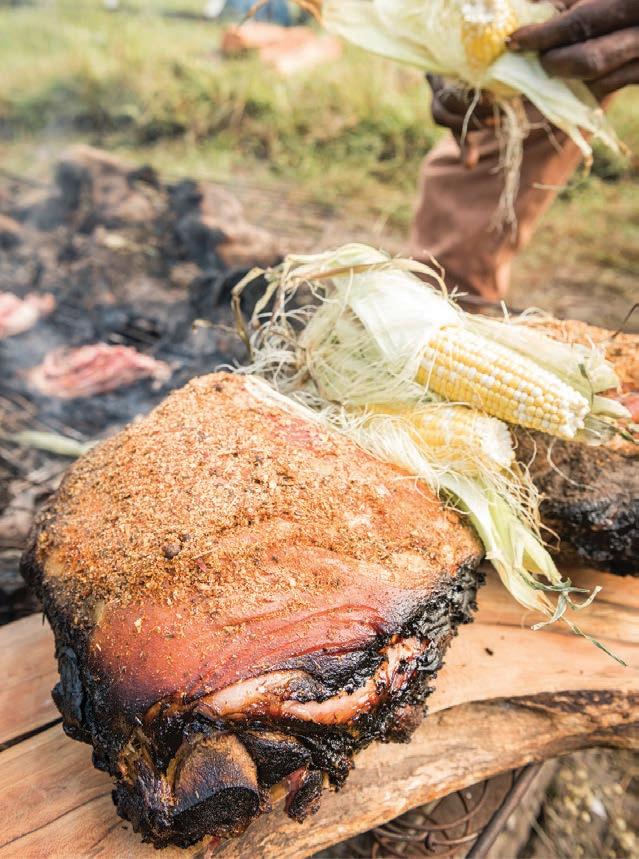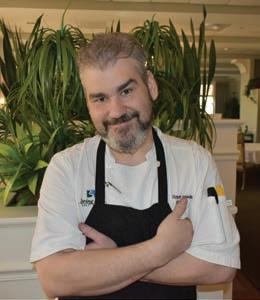
6 minute read
Pastry
from National Culinary Review (Nov/Dec 2021)
by National Culinary Review (an American Culinary Federation publication)
PASTRY EDUCATION
Instructors today teach the fundamentals, plus the added ingredient of social consciousness // By Robert Wemischner

Chef John Schopp, CEC, CEPC, CCA, AAC, with pastry students at Virginia Western Community College (top); Fresh baked bread (bottom). Just like the rest of the educational world, pastry education today is fluid and dynamic, offering both in-person and online classes or a hybrid model. But whether instructors are teaching the classics or newer techniques, educators are confronting new realities.
Baking programs are seeing a healthy increase in attendees, partially as a result of an increased interest in learning how to bake professionally fueled by a period of intense home baking during the earlier stages of the pandemic. Adding to this boom is the record number of openings for welltrained pastry cooks, as many have chosen to move away from the culinary industry in search of other work. It’s truly an employee’s market, and pastry education is rising to the occasion.
“There has never been a better time to get into the industry the right way and grow up into management,” says Chef John Schopp, CEC, CEPC, CCA, AAC, an instructor at Virginia Western Community College in Roanoke, Virginia. On the flip side, he says, “there has never been a worse time to be untrained and uncertified looking for hospitality work. Moving through a grab bag of techniques quickly without reinforcement isn’t education as we need it to be today.”
Focusing on life lessons is also an important part of today’s pastry education. “Thirty percent of our industry is never coming back, but what remains needs to be staffed by educated professional bakers who are trained to be business leaders,” Chef Schopp says. “Efficiency and profitability are paramount, and as educators we need to try to connect the dots between the classroom and the real world.”


An Italian cream cake with black walnuts, enrobed in chocolate ganache with wafer paper feathers and gumpaste rose by Chef Annie Greenslade (left); Pastry Chef Annie Greenslade, the 2020 Texas Pastry Chef of the Year (right).
Giving Back
From the outset, Chef Annie Greenslade, owner of The Sweet Life Chef, a private pastry chef consultancy, and the 2020 Texas Pastry Chef of the Year, has focused her pastry education on improving lifestyles and giving back to the earth. She believes in the importance — now more than ever — of changing the baking and restaurant industry by paying people a living wage, minimizing the menu of offerings and hiring less staff by concentrating on retaining those who are loyal and devoted to their craft. “This will encourage longevity in the staff and put an end to the unsustainable practice of filling the ranks with parttime employees who have no benefits and therefore have only a tenuous tie to the business,” she says.
As part of her mission to “give back to the earth,” Chef Greenslade, a pastry instructor at Grayson College in Denison, Texas, teaches her students to make environmentally sound choices and aspire to healthier eating. She sees no contradiction teaching others to create sweet treats as long as what they produce is seen as an indulgence and enjoyed on a limited and diet-aware basis. “If we are eating mindlessly, we are not eating healthily,” she says. “I’m not just teaching the students about food. I am also teaching them about life, to be good human beings and help evolve humanity to a better place.”
One dessert at a time, one class at a time, she is committed to leading by example. “Small changes can cumulatively make a big impact on the world,”

Hand-blown, sugar-based apple created by Chef John Schopp that he broke after class to demonstrate the delicate nature of these pastries.
she says. “Vote with your dollars: Buy and eat local wherever possible.” For her classroom supply, Chef Greenslade primarily focuses on using dairy, eggs and other ingredients from producers within a limited radius in her vast state of Texas.
Diversity and Inclusion
For Chef Schopp, encouraging certification and a culture of inclusion is key to growing the body of passionate professional pastry chefs for the future. “We follow the ACF’s ladder, encouraging students to take that journey toward being certified by the organization,” he says. “Our students can also learn by listening to all perspectives, with students of all races, genders, sexual orientations, all within a vast age range. A positive workplace implies diversity.”
“We are in the business of comforting people, encouraging the bridging of perceived gaps in our society,” Chef Schopp continues. “We succeed together as a class or fail together as a class. We need to be deft and dynamic. We will either make it together or go up in flames.”
- CHEF ANNIE GREENSLADE OWNER, THE SWEET LIFE CHEF
Personalized Education
Chef Josie Wolfe, culinary and baking instructor at the Center of Applied Technology North in Severn, Maryland, believes strongly in tailoring education to the segment of the industry looking to hire her graduates. “Having the students for all four years of their high school education means that I get to know them well and understand how each of the students learns, including those who have special needs,” she says. “In our program, we have shifted from the old-school mentality that one size fits all. Innovation in pedagogy and open-mindedness leads to efficiency — saving time, energy and money. We have flexibility to use and choose any content that we deem valuable.”
Although never losing sight of the importance of European-based classics, students are encouraged


Pastry students at Virginia Western Community College in Roanoke, Virginia, learn the fundamentals of pastry arts, as well as soft skills such as communication, collaboration and creating an inclusive culture in the kitchen. to bring their cultures to class by sharing ethnic recipes from their heritage. “I would call ours an internationalist approach,” Chef Wolfe says. “Everybody learns and is valued.”
Chef Wolfe is also mindful of the value of developing and maintaining strong relationships with business partners in her market area. “They support the program in many ways and are often outlets for internships during the students’ high school years and will eventually provide jobs when the students graduate,” she says.
“There’s never a better time for pastry,” Chef Schopp says. Why? “Because the American public is energized by food. They are more experimental and knowledgeable than they have ever been. We as professional educators teaching our students to be professionals always need to innovate. More and more, a discerning audience of consumers are getting away from manufactured products and instead looking for the artisan experience, handmade from locally produced food as much as possible — one that is reflective of the community and the region in which we pastry chefs practice and teach our craft.”
Robert Wemischner is a longtime instructor of professional baking at Los Angeles Trade-Technical College and the author of four books, including “The Dessert Architect.”







